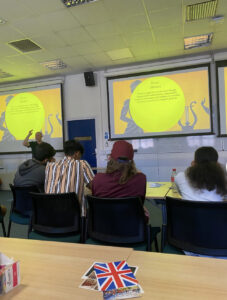Farewell,
Farewell for the time being. This has been an amazing trip in which we have discovered the UK, grown together as friends, and learned about ourselves. After struggling to get out of bed, several of us ate our last dining hall breakfast here, something that I will not miss. A few of us continued our day by biking through Hyde Park. We later arrived at the airport, said goodbye to London, and disembarked on a quite long ride.
It was on this ride that we were given a chance to reflect on our experiences. Considering that this is a leadership trip, it seems reasonable to discuss its meaning. Yet, the more that I think of it, the more that I realize that there is no simple way to define leadership. In fact, trying to create such a phrase will inevitably result in the ambiguous and unhelpful definition that leadership is “the ability to lead”. This is because leadership involves so many variables and entities that a few words simply can’t represent them. Leadership can be conducted from any person in the group, whether they are in a leading or supporting role. As for how effective of a leader you are, that largely depends on your motives and goals. The strongest organizations have shared goals that they are striving to accomplish, they believe and trust in the leader, and the leader uses this power to advance their interests. To lead, one must also be capable of communicating and understanding people’s arguments. They need to be willing to come to a consensus and resolve conflicts as they arise. This ability to communicate extends past one’s organization, as a leader is bound to represent that organization to promote its goals to others. These skills are valuable in leaders, yet there are several other virtues that are not listed. In order to become a leader, one should strive to develop these virtues and gain experience in such a role, with the end goal of advancing their organization’s interests within its moral bounds.
Leadership is not an easily definable concept, at least, not in its entirety. We have learned a few values that make us more capable of practicing it. But, what I would argue to be the most important aspect of leadership is one’s willingness to always continue learning. A good leader will always strive to learn from their mistakes, from other’s mistakes, and take responsibility for their actions. That willingness to learn is what has brought us all here, and we intend to continue learning throughout our entire lives.
I hope these reflections have given an idea of what this trip offers. I could honestly go on and on about our experiences. Simply stated, this trip gave 44 strangers a chance to bond together and learn valuable concepts while abroad.
Thanks for reading,
-Seth
























